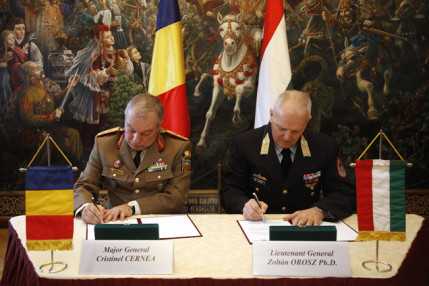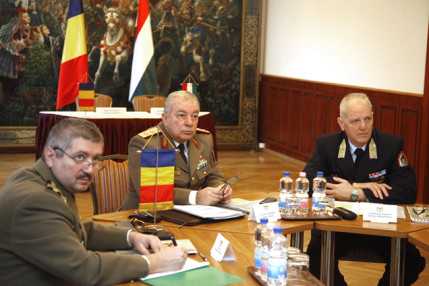New Lead Nation Takes Over TISA Battalion
Szöveg: Péter Snoj | 2016. január 16. 10:03Following Hungary, Romania took over the lead of the TISA Multinational Engineer Battalion on Thursday, 14 January. At a meeting held in Hotel Hadik, Budapest, Hungarian Deputy Chief of Defence Lt.-Gen. Dr. Zoltán Orosz and Deputy Chief of the Romanian General Staff for Operations and Training Maj.-Gen. Cristinel Cernea signed the records of transfer.

After the discussion, Lt.-Gen. Zoltán Orosz told us that “Thanks to the cooperation among the four nations – Hungary, Romania, Ukraine and Slovakia – we have developed a better common understanding of our roles and the tasks assigned to the participating engineer units." Lt.-Gen. Orosz added that the battalion is a kind of reserve force, ready to deploy in the event of such natural disasters that would be difficult or impossible for a nation to manage on its own.
In assessing last year’s results, the Hungarian Deputy Chief of Defence emphasized that the traditionally held Exercise Blonde Avalanche – conducted in the area of Szentes and Hódmezővásárhely in 2015 – had ended successfully. The main message of these annually iterated joint exercises is the continuous state of readiness that all participating nations can count on any time. “I can safely say that having executed a lot of tasks, we are now handing over the TISA Multinational Engineer Battalion in good condition to Romania as a lead nation."

“Romania was already lead nation of the unit in 2012, and now we are very pleased to assume the lead nation role again. Our first and most important objective is to further improve the already outstanding cooperation and, like in previous years, to successfully execute the Exercise “Blonde Avalanche 2016", Maj.-Gen. Cristinel Cernea said.
The battalion will undergo a number of extensive changes in the next period. According to plans, in the future the unit’s area of responsibility will cover the flood areas of River Danube in addition to those of Tisa, which may be more challenging and opens up the possibility of adding national contingents of new countries to the unit. In the near future, Serbia is expected to join the battalion, which is currently operating with the participation of four countries.

Photo: Veronika Dévényi